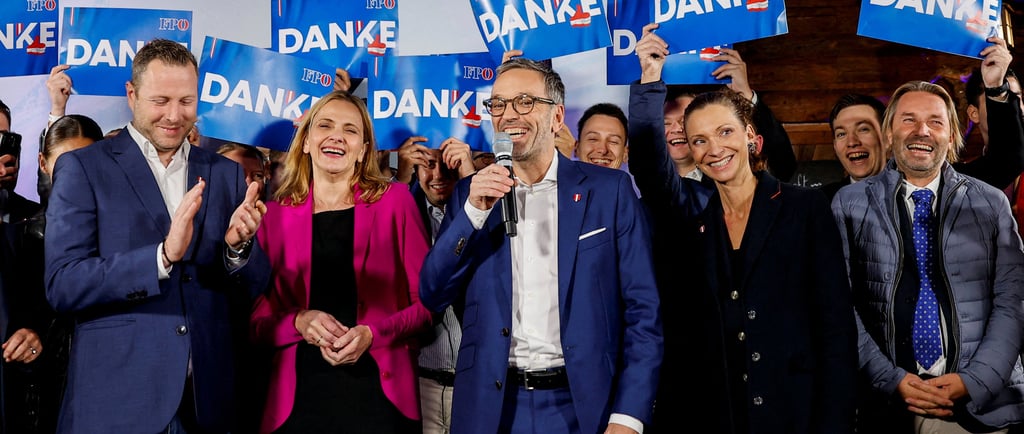Austria: Far-Right FPÖ on Brink of Power
The resignation of Karl Nehammer and the subsequent political upheaval in Austria signal a pivotal moment for the nation and the European Union as a whole. Could this rightward shift herald new opportunities for economic growth, or will it deepen divisions and exacerbate geopolitical tensions within the continent?
AUSTRIA
Aisulu Sarmanova
1/10/20253 min read


The abrupt resignation of chancellor Karl Nehammer has precipitated a political crisis in Austria. The ascendance of the far-right Freedom Party (FPÖ) has taken over the political arena in the European country.
A rightward shift in Vienna would pose an additional threat to the stability of the European Union at a critical juncture by establishing a coalition in the center of the continent that is both pro-Russian and Eurosceptic. This coalition would encompass Hungary, Slovakia, Austria, and Czechia likely to join following the autumn elections. Vladimir Putin, the President of the Russian Federation, would likely take satisfaction in this information. He has endeavored, with varying degrees of success, to leverage his connections in Central Europe to instigate divisions within the European Union regarding the conflict in Ukraine.
The rise of the Freedom Party clears up any doubts about how strong Europe’s populist movements are, especially when it comes to the economy getting worse and people still criticizing the political establishment for not doing enough to ease the tensions caused by the millions of people coming from the Middle East and Africa over the past ten years. Previously, Nehammer, a former military commander who ascended to the position of chancellor in 2021, has announced his decision to step down as the leader of the nation and the center-right People's Party (ÖVP). Thus, the ÖVP party was in charge of Austria’s economic and political affairs for the last 4 years. ÖVP was characterized by the liberalisation of the economy and conservative political views. However, the FPÖ is strongly based on its ideology of far-right and is reluctant to pursue tight economic relations with the European Union further.
Austrian President Alexander Van der Bellen convened a one-hour meeting with Herbert Kickl, the leader of the Freedom Party of Austria (FPÖ), during which he formally requested that Kickl undertake the task of forming a government. “Respect for the electorate’s decision requires that the Federal President recognizes the majority,” he stated, underscoring that he did not reach this conclusion lightly. Protests took place during the meeting between Van der Bellen and Kickl. As per the assertions of the demonstrators assembled in front of the presidential chancellery, a significant shift towards the political right is expected. The Freedom Party of Austria (FPÖ) garnered more than 29% of the vote in the elections held in late September. However, no other political party was inclined to engage in collaboration with Herbert Kickl, a controversial figure who had previously employed pro-Nazi rhetoric prior to the election. In recent months, Van der Bellen has frequently reiterated his dedication to safeguarding the fundamental principles of democracy, which encompass independent media, human rights, and Austria’s membership in the European Union.
The FPÖ under the leadership of Herbert Kickl signifies considerable transformations in Austria's economic and geopolitical orientation. While contentious, this movement offers numerous global economic opportunities for individuals skilled in maneuvering through evolving political environments.
The Freedom Party of Austria’s pro-Russian and Eurosceptic viewpoints may result in modifications to policies that promote the establishment of strengthened bilateral trade agreements with Russia and other non-European Union countries. Energy companies may discover Austria to be more receptive to collaborations and investments, particularly those centered on Russian gas and oil. Austria’s prospective development as a prominent center for Eurasian trade routes may present opportunities within the infrastructure, logistics, and transportation sectors. The strategy of the Freedom Party of Austria (FPÖ) may emphasize the enhancement of national industries and infrastructure initiatives, thereby affording multinational corporations the opportunity to invest in innovative technologies, manufacturing processes, and construction endeavors. Furthermore, an intensified focus on economic autonomy may amplify the necessity for collaborations in sectors including industrial automation, renewable energy, and agriculture.
Opportunities within the Central European region may be stimulated by Austria’s evolving political position. The implementation of coordinated policies among these nations can facilitate enterprises endeavoring to establish a presence in the region and foster cross-border investment and trade. Significant investments may be attracted by shared interests in energy security, military matters, and digital transformation from nations or corporations that are amenable to policies less centered on the European Union.
Notwithstanding its challenges, the populist agenda of the FPÖ has the potential to catalyze investments in technology pertaining to migrant management, border security, and surveillance. Organizations that demonstrate expertise in cybersecurity, biometrics, and artificial intelligence-driven solutions can secure lucrative contracts in Austria and its adjacent nations. Organizations must conduct a thorough evaluation of reputational risks to navigate this landscape effectively.
Austria’s political transition under the Freedom Party of Austria has the potential to transform the dynamics of regional trade within Central Europe and create numerous global commercial prospects, particularly in the energy, infrastructure, and technology sectors. Organizations that demonstrate an extensive comprehension of geopolitical intricacies and exhibit adaptability in their strategic approaches can significantly capitalize on this evolving environment.


